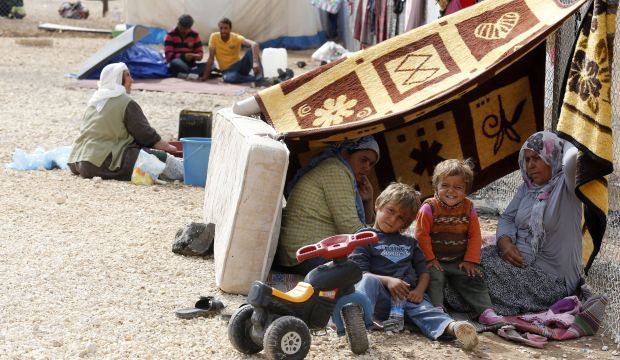
Kurdish refugees from the Syrian town of Kobani take shelter in a camp in the Turkish town of Suruç, on October 14, 2014. (Reuters/Umit Bektas)
Beirut, AP—The main Western-backed Syrian opposition group opened a three-day meeting Friday to discuss a range of issues, including a Russian initiative to hold peace talks in Moscow to broker a resolution to Syria’s civil war.
The Syrian National Coalition is also expected to elect a new president during the closed-door proceedings that opened Friday in Istanbul.
The meeting comes amid a push by Russia, a key supporter of President Bashar Al-Assad, to try to bring the Syrian government and the opposition together in Moscow for talks to end a civil war that has killed more than 200,000 people. Russian diplomats have been shuttling between the sides in recent weeks to sound out their willingness to attend the meeting that the Kremlin has said it hopes to convene after January 20.
The Coalition has not ruled out participating, but has so far insisted that any negotiated settlement be based on the so-called Geneva platform, which states that there should be a political transition toward democracy through the formation of a transitional governing body with full executive powers.
Assad’s government has said it is ready to attend “preliminary” talks, but says they should pave the way for a conference in Syria itself.
Russia has said that the first stage of talks would include members of both the government-tolerated internal opposition and opposition groups based abroad, including the Coalition. In the next stage, they would be joined by Syrian government representatives.
Elsewhere, UN envoy Staffan de Mistura is attempting to decrease the level of carnage in Syria through a plan that calls for “freezing the conflict” in the northern Syrian city of Aleppo as a building block for a wider solution to the war.
So far, there is little to suggest that the UN plan or the Russian initiative has a real chance of success. But analysts say there is a greater chance now for a settlement as a result of recent government losses in the north and south as well as growing resentment toward Assad among his traditional supporters—particularly after the mass killings of soldiers by militants.

Erdogan wants to control everything, including the Syrian opposition. As long as the opposition is hosted and funded by Turkey, its legitimacy is null and its efforts to have a role in the negotiations is doomed.
Turkey’s interference has a negative impact on the solution to Syria and any other Arab country.
It is time it gets out of the way.